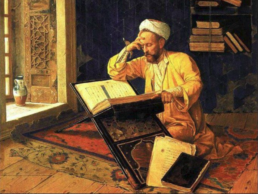Should we build or rectify?
Islam attracts all sorts of people, from those looking for a sense of community, fleeing a dysfunctional life, or looking for a cause, to those who aren't necessarily looking for something but simply come to be convinced of the genuine Abrahamic conception of God and the wider existential narrative preached by his descendant, Muhammad, the final messenger of God.
Yet one thing I've consistently noticed over a decade is how community leaders, activists and Muslim spokespersons are rarely (if at all) from the latter. They tend to either be those who found a (secular) cause in Islam or saw the faith as an extension of their ethnic identity that they were attempting to protect against rising racial prejudice we see across western societies. Very rare has it been to have someone speak on behalf of the faithful who simply believes Islam is a justifiable and convincing position to hold and has little baggage from the past. One would have had to have thought about these things deeply and engaged with the revealed word, which very few seem keen on actually doing.
So you want to be a scholar? Things to consider
Traditionally, Arabic books published on this topic tend to be titled talab
al-‘ilm (Seeking knowledge) or kitab al-ilm (book of knowledge), and
focus on some sort of general curriculum reflecting the legal (fiqh) and
theological (i’tiqād) inclinations of the author. I don't think it necessary to
reproduce that here. Instead, I offer some considerations (by way of questions)
that aren't so often discussed.
The hill to die on
There are many things that people choose to make their hill to die on, the significant contribution they made here, but what they often overlook is whether that’s gonna be the thing they want to meet God with. Imagine standing before the Lord of all the worlds, King of kings, Subduer of all realms, and speaking of the greatest contribution you sought to God’s plan for humans on earth:
“I wanted to make sure we sighted the moon properly”
“I tried to get people to believe the Prophet was alive/dead in his grave”
“I tried to convince people that shaikh X was the greatest scholar”
“My mission was decolonialism”
“I was a proud anti-racism campaigner”
“I argued against critics of x mad’hab”
“I wanted to prove Jesus shall return”
“I wanted people to know wiping over their socks in wudhu isn’t allowed”
Now neither is my point to negate the idea that we all naturally have different roles to play for the collective benefit of God’s servants, nor that some of these things aren’t important to the greater plan, but God didn’t put us on earth primarily for any one of the above nor is every one of things legitimately a task for everyone.
Yes, many of these things some of us ought to pay attention to, but it should be in a way that speaks to the overall divine project, not as singular subject matters in and of themselves.
One of the main tasks we have (and an important corollary to appreciating God and purifying ourselves for Him, which is also the essential purpose of ‘enjoining good and forbidding bad’) is to produce and maintain an environment that’s conducive to appreciating God and purifying ourselves for Him. This means that everything we do ought to speak to this objective, and undertaken in a way that directly leads to it. And it’s very evident that most Muslims do not (instead relying on short-term fixes or superficial approaches and arguments appropriated from wider narratives) and as a result much hasn’t positively changed or progressed.
When we don’t, then we are simply unable to to resolve such issues productively, since the atomisation of solutions (which overlooks the interconnected nature of all aspects of human life) result in superficial resolutions and not substantial rectification (islah).
And the more people atomise their approach, the more at risk they are of falling into a silo mentality and parochialism - both a plan of the devil and something God warns believers about through tales of the Children of Israel.
The brief point here is twofold:
- Keep your eye on big picture and ultimate purpose
- Don’t commit your time to silly or inconsequential issues, have something substantial to meet God with.
At the base looking upwards
2 min read
I love the shari'ah.
I'm obsessed with it. I study it, think about it, brainstorm with it, and absolutely marvel at it. The i'jaz (inimitability) of the sharī’ah is pure artistry. I mean shari'ah in the general sense, as the directives revealed from God. This doesn't merely include ahkam (laws), but also implicit directives in the parables, stories and histories God relates and His Messenger explored.
If the sharī’ah were a museum, I'd spend all day wondering through its galleries, soaking in the beauty of its exhibits, enchanted by its artifacts. As I explore the cosmos of hikam (wisdoms) in even the smallest things God addresses, I appreciate God's directives as pieces in a mosaic that comes together to produce a fascinating whole, that speaks profoundly to every aspect of human existence, no matter how mundane or seemingly insignificant.
The sharī’ah tells us something about God, His order in the universe, and His expectations of humans. It is a cultivating force evident in its achievements: to bring an illiterate people with godly resolve out of the desert to become the world's greatest civilisational influence.
Anyone who has mastered anything knows that the most important aspect of that thing is its basics. And mastery begins with identifying profundity in the simple. This goes for subservience to God as well. As I've put it many a time, if believers were merely to explore the five pillars: what they tell us about God's expectations on earth, what their purpose is, and consequently what proper functionalisation looks like, it'd suffice a person's lifetime! It has occupied me for the past 15 years and I've barely scratched the surface - every year I come to realise I knew nothing the year before! And if this goes for the five pillars on which the edifice of subservience to God (islam) is built, what for the edifice itself?!
But as my mind runs through what is clearly an unending and inspirational journey I realise that the people must start somewhere. So on the #QuestForMeaning, let us turn down the noise; do away with distractions and tangentials that lead to irrelevance. We want to go back to basics and take people through the meaningful substance, radically examining everything from the sharī’ah's first principles. Let us stand, at the base looking upwards, in awe of it together!
May God grant us all to good fortune, happiness and contentment, and guide us to celebrate His Holiness. And I pray for steadfastedness with all of our challenges ahead, and that He make me unflinchingly committed to the cause of righteousness and an unswerving agent of His will.
Protecting ourselves
6 min read
For years, many of us have spoken about the need for British Muslims to prepare themselves in the (martial) combative arts, both as an engaging way to keep fit (for some simple exercise is boring), and to provide a means of defence for ongoing anti-Muslim and racist physical abuse that heightened particularly after the 7/7 atrocity. And yes, it wasn't a matter of mere advocacy, we did it ourselves.
More recently, I've been asked as to why it hasn't taken root in the faithfuls' culture. I'd say:
Are Arabs the best scholars, just because they’re Arabs?
6 min read
I rail against paternalistic Eastern (Arab and Asian) superiority and the infantilization of Muslim westerners. To be clear, this isn’t to negate the obvious fact that there are scholars in the Middle East nor that we cannot benefit from the good it has to offer (like anywhere else), but I'm briefly addressing an ongoing presumption amongst many Muslims in the west that eastern is better merely because it is eastern. This is in some part built on a fetishization of the Middle East and particularly by those who don’t have any actual experience of what education there is like. For many, it is a mystic land in which scholars attend mosque circles in all their regalia and scholarly glory, ruminating deeply on the Quran, hadith, fiqh, usūl, aqīdah, kalām, etc. Yet this depiction couldn’t be further from the truth.
There is nothing intrinsic to Arabness that elevates the Middle East's ability to engage in Islamic scholarship at a higher level. In fact, Islamic history attests to the fact that Islamic intellectual development, in all shar’ī realms was mostly the domain of non-Arabs. Ibn Khaldun famously wrote:
10 points for leaders on engaging with the opposite sex
6 min read
Those in religious training seldom receive adequate training/counselling in how to operate in the religious realm and overcome challenges in engaging with the opposite sex. The issue of spiritual abuse in confessional spaces is a real one, and obviously it's not exclusive to Muslims. There is a lot of discussion on this topic and it's about finding a balance that allows a scholar to fully benefit the opposite sex, but with safeguarding measures in mind. Often, these safeguards are often thought about in the superficial sense (niqab, partitions, etc) and merely address symptoms, which is why it remains a problem.
The following are 10 points of consideration for those in the field, although it’d be good for all of us to think about them. This post is gleaned from scriptural sentiments, personal experiences (of mine and others), and the insights of Muslim women - the other side. Of course, the starting point is God consciousness, and much is said/written on the subject. So assuming this to have been covered, here as some other brief points to consider:
British & American Muslims: differences & ramifications
5 min read
A matter to highlight is that we are very different from our American brethren, and it doesn’t work well with our interests to assume that their issues are ours, or the same. The problems that arise from this is that we are unable then to address our own unique set of circumstances constructively that are shaped by different variables.
Of course, I have my own views on each of the following, but my point here isn’t to make value judgements about our cultural, political and social reality, nor to say anything about the variables that impact on the difference, but merely point them out for those who haven’t considered them:
Stable and secure believing women and our future
Anyone who cares about the present as well as the future of the believers, has to be concerned with the social conditions under which believing women live and their sense of security and stability. If the purpose of the Prophet’s polity was to provide believers with “security to replace their fear” (24:55), then in general, such objectives ought to also be our own. It was such security that not only allowed believers to grow and thrive but also facilitated the spread of the nascent faith. Women tend to be the pillars that hold up the structure of society, they are the carriers of culture, the (more significant) nurturers of today’s citizens, as well as the cultivators of future generations. The future isn’t bright if they’re not happy, and the future won’t be consequential if they’re not content (and resultantly committed). Yes, it requires women to be sensible and realistic in discovering contentment, but it also means that believing men need to provide the conditions for them to be able to do so.
If we think about it from the perspective of our communal interests and the cause of Islam:
Social and political progress tends to be slow. It does not predominantly occur through revolution (an idea that popular culture has come to embrace) but by gradually cultivating today and tomorrow’s citizens - it's the reason Gove was so happy to be education minister. For the sake of the future, we can only expect tomorrow’s people to be confident, faithful and educated folk IF they’re cultivated by equally confident, faithful and educated folk (and of course that includes men as well). Yet despite its demonstrable importance, the environment in which this might occur hasn't significantly developed. Rather than being supported and permitted to get on with it - to seek an environment that’d help to shape confident, faithful and informed believers, many Muslim women find themselves having to battle social and ethno-cultural pressures as well as reductive, condescending and unrealistic ethno-cultural assertions about their ‘place’. It wears them down and inhibits constructive activity. And no, rhetorically referring to Muslim women who are practically treated like mindless maids as ‘queens’ or ‘jewels’ doesn’t make them feel valued – and this isn’t lost on anyone with a semblance of intelligence. Furthermore, it certainly doesn’t lead to the members we all need believing women to be.
Instead, what we regrettably continue to see is a milieu that produces countless restless beings with various worries, who frequently have their good and charitable nature exploited, who remain greatly unappreciated for their labours, whose views might be overlooked simply because they’re women, and who are given legitimate cause to be anxious about their prospects rather than thrilled at the opportunities and positive challenges the future ought to bring. Whilst some men might put it down to "women's nature", God tells men to challenge their own perceptions:
“Live with them in accordance with what is fair and kind: if you dislike them, it may well be that you dislike something in which God has put much good.” (4:19)
Of course, not all believing women find themselves in such a situation, but even they would acknowledge that the current environment promoted by most ethno-religious communities isn’t one conducive to high aspirations, or one that reflects a godly and productive lens that provides the holistic type of security and stability believing women desire. As believers, we are morally obliged to build an environment where women are able to flourish and become the best women on earth (and the same obviously goes for our men and children).
Some men suffer from protest fatigue. I accept that, as is the case with complaints in any setting, not all are always legitimate. But there needs to be a constructive way of discussing worries in a spirit of cooperation and reason, rather than falling into reductive arguments, belligerence, or retreating into silos and talkshops. I also accept that many believing women have some way to go to become substantial contributors to the future of an inspirational Islam in Britain, but so too do many men – it’s not a gender issue but one of general development. However, if women aren’t provided the space, opportunity and know-how to develop a holistic approach to īmān which improves the intellect with reason and knowledge, the body with vitality, and the spirit with civility and resilience, as well as an emotionally and psychologically sound atmosphere required to achieve all of these, then as a believing community we won’t get very far. It’s easy to put women down, which occurs in some cultures, and claim they don’t know much or that they’re 'slow', but if resources in many communities are mainly geared towards men, and women frequently infantilised, how can we expect them to be on level par? Studies show that where women are given the same educational opportunities as men, they outperform them. Evidently, a phenomenal human resource is being squandered, and in some cases, actively undermined. Is it any wonder that some Muslim women opt for Eurocentric feminism when it seems to offer them more equitable terms? “Islam gives women rights” becomes an empty slogan if not practiced by adherents to that Islam, not to mention that the use of this slogan can inadvertently suggest that if Islam hadn’t advocated such rights, such sloganeers simply wouldn’t bestow equitable treatment to women out of a sense of decency and some good old logic.
استوصوا بالنساء خيرا
The Prophet put it: “Treat women well,” (al-Bukhari) and ‘well’ is not only determined by the situation, but also in the context of being sensitive to the needs of women whilst simultaneously encouraging them to strive higher. In a gender-conscious verse God spells out the relationship between the two groups: “The believers, both men and women, are allies supporting each other (awliya)…” (9:71) and such support includes men cultivating their vital team members and expanding their capacities rather than simplistically putting them down. That’s actual leadership. Furthermore, as believers we inspire one another to be the best reflections of ourselves with the Prophet having put it, “The believer is the mirror of a believer”. So if some men hold the women around them in low stead then they must consider what they themselves actually look like!
As for believing women, it’s up to them to assert themselves and take the bull by the horns, and neither squander nor disregard the opportunities they’re availed by emerging opportunities. Complaints about lack of resources and/or access are often inaccurate or a pretext for some to veil their laziness or lack of commitment. In the end, the effort needs to be made by both sides.
Shar’ī therapists, counsellors, and murabbis
Over the years, I and many of my colleagues have come to experience that the vast majority of Muslims do not require scholars (and little do they know what a scholar and his/her remit actually is). What they’re really after: shar’ī trained therapists, counsellors, and murabbis (educator and shar’ī life-coach).
The reasons for this are:
- We live in a time where technologies and modern ideologies/fads have left people confused, which notably leads to emotional and psychological instability.
- The economy, social expectations, and contemporary fashion/outlook has left people with feelings of anxiety and despair.
- Shar’ī literacy is extremely low, and most of what the Muslim majority know is either partially incorrect, misses the point, or based on very erroneous assumptions. (At this level, getting academic about Islam is far too advanced - most need the basics of the basics)
- Subsequent generations of Muslims from immigrant communities (which make up the majority) struggle to find an adequate model for western Muslim living, in a way that faithfully, confidently, and productively navigates the complexities of living in modern western society. Additionally, inherited norms and attitudes conflict with their aspirations, outlooks and feelings that are shaped by a (western) cultural and social environment that significantly differs from that of the cultural environment their parents or grandparents were shaped by and which later generations are (often counter-productively) socialised into at home.
- Regressive attitudes within many ethno-cultural communities (and of course every culture has them) coupled with shar’ī illiteracy and a politicised/weaponised Islam has led to: the dismal treatment of Muslim women and other groups, misery-inducing expectations of others, and personal dejection. From amongst the results, many Muslim men/women suffer a crisis of masculinity/femininity as well as too many Muslim women left morose with mistrust due to bad attitudes and treatment.
When people come to a scholar, they’re not really looking for a legal judgement or a theological solution, they’re looking for someone who’ll help to talk through their personal problems and help them come to some basic conclusions in a way that considers their religious aspirations. Even if they’re asking a theological question (such as divine decree or free-will) often it has to do with uncertainties in their personal lives rather than simply an intellectual issue. Some simply want such a therapist/counsellor to give them a version/narrative of faith that’ll quell their anxieties and help them overcome emotional challenges. Nearly all imams (as well as those popularly taken as scholars) are actually therapists, counsellors and murabbis.
However, this doesn’t render actual scholars useless, and in fact, where a scholar can also engage with people as a murabbi, it’s a very powerful and productive experience since they bring the weight of what they know about the sharī’ah with all of its intricacies to real-life practical situations in order cultivate the best of outcomes, rather than the reductive views of many preachers and clerics.











